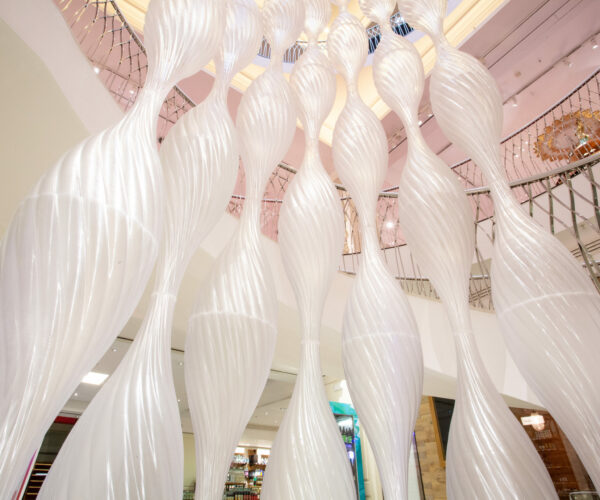YEAR:
2021
LOCATION:
LONDON
STATUS:
COMPLETED
About the Project
Mellifera, an installation of swirling, 3D printed beehives, dancing through the Fortnum & Mason atrium, aims to highlight the need for rewilding of our urban spaces. The 3D printed modules will make their way up the atrium to an illuminated ceiling made of bioplastics and will showcase advances in material innovation and technology. Made from fermented sugar, the components of the installation are fully compostable and in the spirit of the circular economy will be reusable after the event.
Sustainability and Circular Economy:
The Mellifera installation is a testament to the advances in material innovation. Made from PLA (polylactic acid), a bioplastic derived from fermented plant starch, the installation’s components are not only visually stunning but also fully compostable. The use of PLA reduces energy consumption by up to 80% compared to traditional petroleum-based plastics and is biodegradable under specific conditions. In line with circular economy principles, these modules are designed to be reused or composted, ensuring that Mellifera has a life beyond the event.
Educational Impact:
The installation is more than just a visual experience; it’s an educational one. The work highlights the urgent need to support biodiversity, especially bee populations, which are under threat due to habitat loss, climate change, and pesticide use. Visitors are invited to reflect on the environmental impact of everyday materials and discover how bioplastics, like those used in Mellifera, offer viable alternatives that can restore balance to our ecosystems.
Fundraising and Legacy:
To further support the mission of pollinator protection, individual 3D printed modules will be available for purchase following the London Design Festival. Fifty percent of proceeds will be donated to Bees for Development, a charity dedicated to sustaining bee populations and promoting biodiversity. This initiative not only raises funds but also allows the public to take home a piece of the installation, reminding them of the interconnectedness of art, innovation, and environmental stewardship.
Technical and Material Highlights:
- 44 x 3D printed beehive modules: Produced locally at Fab.Pub using PLA bioplastics.
- PLA (Polylactic Acid): A sustainable, renewable material sourced from fermented plant starch, acting as a natural carbon sink. PLA reduces carbon emissions by up to 80% compared to petroleum-based plastics and is biodegradable under industrial composting conditions.
- Environmental Benefits: PLA emits 30 times fewer toxins than conventional plastics when heated and breaks down within 6-24 months in marine environments, compared to hundreds of years for petroleum plastics.
- Circularity: The PLA used in Mellifera follows a “cradle-to-cradle” approach, from nature back to nature without harming habitats.

The Concept
The beehive modules are elegantly suspended and arranged to emulate the natural, swirling patterns of bees in flight. This movement through the open space of the atrium mirrors the flow and energy of urban rewilding efforts, encouraging viewers to envision cities alive with natural life. The bioplastic ceiling glows softly, representing the light and hope of sustainable practices in material science and the broader world.
TEAM
Mamou-Mani Ltd.
Arthur Mamou-Mani, Yvonne Onah, Fun Yuen, Krishna Bhat, Chioma Ekwo
Fab.Pub Ltd.
Giovanni Panico, Jonah Maxted








